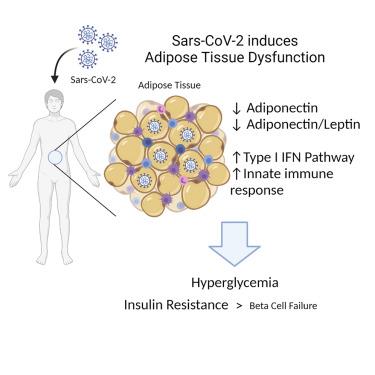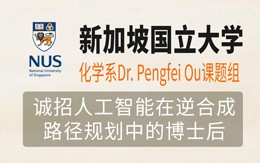Cell Metabolism ( IF 27.7 ) Pub Date : 2021-09-16 , DOI: 10.1016/j.cmet.2021.09.009
Moritz Reiterer 1 , Mangala Rajan 2 , Nicolás Gómez-Banoy 1 , Jennifer D Lau 2 , Luis G Gomez-Escobar 3 , Lunkun Ma 1 , Ankit Gilani 1 , Sergio Alvarez-Mulett 3 , Evan T Sholle 4 , Vasuretha Chandar 5 , Yaron Bram 5 , Katherine Hoffman 3 , Priya Bhardwaj 2 , Phoebe Piloco 2 , Alfonso Rubio-Navarro 1 , Skyler Uhl 6 , Lucia Carrau 6 , Sean Houhgton 7 , David Redmond 7 , Alpana P Shukla 8 , Parag Goyal 2 , Kristy A Brown 9 , Benjamin R tenOever 6 , Laura C Alonso 8 , Robert E Schwartz 10 , Edward J Schenck 3 , Monika M Safford 2 , James C Lo 1

|
Individuals infected with SARS-CoV-2 who also display hyperglycemia suffer from longer hospital stays, higher risk of developing acute respiratory distress syndrome (ARDS), and increased mortality. Nevertheless, the pathophysiological mechanism of hyperglycemia in COVID-19 remains poorly characterized. Here, we show that hyperglycemia is similarly prevalent among patients with ARDS independent of COVID-19 status. Yet among patients with ARDS and COVID-19, insulin resistance is the prevalent cause of hyperglycemia, independent of glucocorticoid treatment, which is unlike patients with ARDS but without COVID-19, where pancreatic beta cell failure predominates. A screen of glucoregulatory hormones revealed lower levels of adiponectin in patients with COVID-19. Hamsters infected with SARS-CoV-2 demonstrated a strong antiviral gene expression program in the adipose tissue and diminished expression of adiponectin. Moreover, we show that SARS-CoV-2 can infect adipocytes. Together these data suggest that SARS-CoV-2 may trigger adipose tissue dysfunction to drive insulin resistance and adverse outcomes in acute COVID-19.
中文翻译:

急性 COVID-19 中的高血糖的特点是胰岛素抵抗和 SARS-CoV-2 的脂肪组织感染
感染 SARS-CoV-2 并表现出高血糖的个体住院时间更长,患急性呼吸窘迫综合征 (ARDS) 的风险更高,死亡率也更高。然而,COVID-19 高血糖的病理生理机制仍不清楚。在这里,我们发现高血糖在 ARDS 患者中同样普遍存在,与 COVID-19 状态无关。然而,在 ARDS 和 COVID-19 患者中,胰岛素抵抗是高血糖的普遍原因,与糖皮质激素治疗无关,这与 ARDS 患者但没有 COVID-19 的患者不同,后者以胰腺 β 细胞衰竭为主。葡萄糖调节激素筛查显示,COVID-19 患者的脂联素水平较低。感染 SARS-CoV-2 的仓鼠在脂肪组织中表现出强大的抗病毒基因表达程序,并且脂联素的表达减少。此外,我们发现 SARS-CoV-2 可以感染脂肪细胞。这些数据共同表明,SARS-CoV-2 可能会引发脂肪组织功能障碍,从而导致胰岛素抵抗和急性 COVID-19 的不良后果。































 京公网安备 11010802027423号
京公网安备 11010802027423号